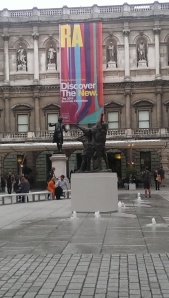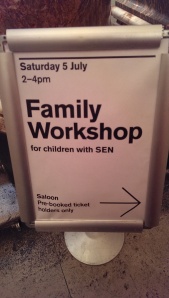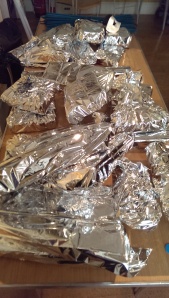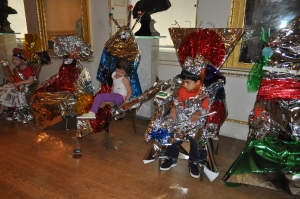I am rushing and I can’t be late, volunteering at Bromley Museum in the morning, a rush to the station, lunch on the train. It is hot and muggy, I have a blister on my heel, I mustn’t be late. I am off to observe a family special educational needs (SEN) session at the Royal Academy of Arts, it is Saturday, busy, bustling, tourists, Londoners, art lovers, the streets are crowded.
I dodge past pedestrianised bullets and into the courtyard at the Royal Academy, my pace quickens, my blistered heel forgotten. I am just about on time to experience a fairly new initiative from this home for art and artists. The fourth in a series of workshops for children with special needs and their families, led by an artist and free to attend. The only snag is the need to pre-book, when I found out about the session it was already fully booked so I feel very privileged today to come along and see what these sessions are all about. I am intrigued to see how they work, who comes on them, how many families there are, all manner of questions are tumbling around in my head.
I found out about the programme via an online comment on the Museum Journal website, made by Beth Schneider, Head of Learning at the Royal Academy of Arts. The article was on ‘Welcoming Autistic Visitors‘ and featured case studies of museums working to make their venues less intimidating for people with autism. I have to say the Royal Academy is not the first place that comes to mind when I am thinking of family friendly places, let alone SEN friendly. It is my own unfair preconception, I only have to think back to my last visit to their ‘Sensing Spaces’ exhibition which was bursting with colour, fun and playful discovery of architecture for adults and children.
I am warmly welcomed and taken up to meet the artist, Cash Aspeek, who is leading the two-hour session. She fills me in on how the sessions work: numbers are kept low, there are seven families booked on today, around 20 people including volunteers. Each event has a different theme, today they will be creating thrones to mirror the opulence of the John Madejski rooms we will spend the afternoon in. Previous sessions have engaged families with architecture, making trees, and inspired by El Anatsui’s sculpture from the 2013 Summer Exhibition, the families worked together to create one collective piece of art. There is no cut off in terms of age or ability, everyone is welcome.
I am introduced to a couple of families before the session starts. I am nervous, I feel like I am intruding by asking all these questions, but they are all so kind and generous with their time and answers, sharing their thoughts with me. Some have been before, for others it is a new experience, yet what comes across from the start is this environment is friendly, supportive and non-judgemental, they are all in the same boat.
I talk to a mother, an artist, whose son has West Syndrome, a form of epilepsy. Unable to talk or walk, he is lying on the floor enjoying the space, looking up at the gold glinting on the ceiling, no one minds, no one is trying to move him. His mum tells me that art for her, for her son, is a way to express themselves. I apologise for asking her such personal questions about her life, and her son’s life, I struggle to find the right words. I ask “What are your son’s ‘difficulties’?, but he is not being ‘difficult’ he is very content at this time, in this place. The word feels wrong in my mouth, even though I have an autistic daughter, I feel a bit lost here, a bit out of my depth. What right have I to quiz and question? But I want to understand what these families have come here for, why these session are important. I want to know if they visit other museums and galleries, what are the challenges?
I chat to another family, they have three girls, 10, 7 and 3, the youngest has Rhett Syndrome, and is in a specially adapted pushchair. Her sisters flit about, eager for the session to begin, one settles on her dad’s knee. They remind me of my kids, very similar in ages, they are all beautiful girls. The dad tells me they want to enjoy things as a family, they do get out and about but there is a lot of planning ahead. The basic things like accessibility, signs for the lift, it can be these simple, basic things that really help. They do go to the Natural History Museum and the Science Museum but they also sometimes have to cope with stares and comments. A few families here know each other, you can feel their support network, an unspoken safety net, someone who understands and doesn’t judge.
The session begins and I sit in the corner, a family arrive late, but the artist, Cash, gives them time to settle, not forcing them to join the initial welcome, a simple overlooked act of flexibility that can make a real difference to a child who is unsure on first arriving. The families each take a chair and work with materials placed around the room, mirror foil; shining, reflective, coloured film; bright red and green, large foam shapes wrapped in shiny foil, good old gaffe tape is wrapped, cut and stuck, there are space blankets and sparkly jewels.
I get up and try to chat to a mum, Cash quietly leads me back to my chair, she asks me to let them engage, take my time to observe. I feel so out of place – I am used to either being the mum with my family getting involved, or when they are not around, I am used to being the volunteer, helping and sharing the creative experience. This feels so alien to me to sit and watch. I listen to Cash, I stop, I am still. I look at the mirror foil shining and gleaming. I notice in my stillness a baby is sitting in the middle of a foil blanket mesmerised by the glint of light. I listen to the sounds of these materials, the scrunch and crackle. I listen to the snippets of conversation –
“Oh, look at that!”
“Would you like some red?”
“Wow, look at that one!’
I can see this session is working so well because it is not just about creating, it is about engaging the senses, it is about the touch and feel of materials, the way they look and for some even the way they taste. These marvellous creations take shape and I can’t stop myself from smiling at these thrones, a cross between space rockets and giant sweets, futuristic and fun, regal and royal, yet childlike and inviting.
I look up and notice a young girl, a blue crown adorning her beautiful pale blonde hair, pipe cleaner peaks of green, red, yellow and orange. I look up again and in the time it has taken me to write a paragraph she has swapped it for a jewelled mask. Art has become the doorway to imagination, another child wears a foil cape, thrones have led on to crowns, sceptres and regal robes. What began as something concrete and solid has transformed into something free.
As the thrones become completed they are moved in front of grand mirrors and gold mouldings, the children sit in their creations. The family I spoke to earlier with three girls have completed their masterpiece, the older girls dress each other, one darts into another room to grab a cookie, the youngest is lifted on to the middle one’s lap. Photos are taken, families proud of their endeavours. A boy catches sight of himself in the mirror and laughs in pure delight at his transformed appearance, it is a beautiful moment I am privileged to observe.
There is one boy who is not happy, his mum tells me he is tired, sometimes there are good days, sometimes there are bad days. I know that from my own daughter, it doesn’t always matter how you prepare, what you do, how you do it, it still doesn’t work. That is life, these sessions are not a magic wand, but there is another quiet room to go into, in this instance I think it helps, it is the flexibility of the space and session that gives parents and carers the room to breathe and work out what is best.
The children in this session are all different, they have different needs, they have different families, some with siblings, some without. You can’t make an event that strips out everything that might cause a difficulty, in this session the activity is not about disability, it is about family involvement in art and creation. It is the surroundings and staff that make this work, numbers are kept low, there is understanding, flexibility, no stares, comments or judgement.
How to make sense of this session? I am used to history, science, knowledge, hard facts and dates. This is different, this is about accessing art, sights, sounds, the feel of material, colours, textures, imagination and creation. Near the end of the event a lovely volunteer, Sylvia, comes to sit next to me. I think she senses I am at a slight loss for all my good intentions. She chats to me about the other volunteers who work on the accessibility programme, for the deaf, those in wheelchairs and the blind. It is the dementia events and the way she describes them that really move me. I have an aunt with dementia and what she talks to me about, I understand from my own experiences of this debilitating disease. In Sylvia I can see this attitude, the work that culminates in today’s session is an ethos – it is not just about one event.
At the very end of the session a mother asks if I know of any more sessions like this elsewhere, she is desperate for more. She knows 150 families in a support group and they all need this. Today is 7 families, the Royal Academy of Arts run 4 sessions a year, 28 families in one year, that is simply not enough. When I talked to these families, not one moaned or complained about how hard and difficult it is, so I will do it for them. They love their children and want the best for them like we all do. To be able to do this, to come and spend an afternoon playing, creating and engaging as a family, I just don’t know the right words to say how important this is. There is massive need for these type of events, the more places run them, the more families can experience what these 7 families have.
I will leave the final word to Beth Schneider, quoted from her initial comment where I first found out about the event. Please, if you work in a museum, if you run family events, if you fund these events, listen, help, do this thing. Museums, galleries and cultural institutions are uniquely placed to take families and let them be families just by supporting, listening, understanding and not judging.
“The high demand for places on these workshops is proof that there is a huge demand for cultural institutions to develop programmes targeted at inviting children with special educational needs and their family.” – Beth Schneider – Royal Academy of Arts
An edited version of this blog also appears on the Royal Academy of Arts website – http://www.royalacademy.org.uk/article/239
xxxxxxxxxxxxxxxxxxxx
I would like to thank Beth Schneider, Head of Learning, Molly Bretton, Access Officer and Becky Jelly who welcomed me on the day.
Also a big thank you to the volunteers, in particular Sylvia and Cash Aspeek the artist who ran the workshop and made me feel very welcome.
Lastly a thank you to the families who answered my nosey questions and introduced me to their lovely families, I appreciate the time you spent with me and the honesty of your answers.
The sessions are funded by Jean and William Callanan.
xxxxxxxxxxxxxxxxxxxx
Please contact the Royal Academy of Arts to find out more about further sessions planned this year, they will be continuing the programme with four sessions in 2015.
Next event Saturday 11th Oct 2014, 11am-1pm, to book please check website https://www.royalacademy.org.uk/event/family-workshops-for-children-with-1
Email access@royalacademy.org.uk or call 0207 300 5995
xxxxxxxxxxxxxxxxxxxxx
The link to the Museums Journal article is below but you need a subscription to access it.
To find out more about the artist Cash Aspeek please take a look at her website – http://www.redstartarts.com







Comments 6
Great to hear about this – it would be wonderful if more museums opened themselves up to visitors with special needs. I still haven’t forgotten my visit to Tate Britain with my autistic daughter when we got ‘told off’ when she touched the Henry Moore statue.
Author
Things are changing (slowly)! Thanks for the comment.
A touching, honest account. Agreed, a lot more needs to be done, and reading accounts like this can help us all reflect on our own practice and hopefully make changes, however small, to make museums more accessible.
Author
Thanks Katherine, sometimes it is the small things that can make a big difference.
AF at the Royal Academy! Now that’s what I call a serious inroad 🙂 Lovely piece Tinc – I really enjoyed your honesty about feeling outside your usual roles. Thanks for sharing…
Author
Thank you for reading Liz, it was a more emotional day than I thought it was going to be.